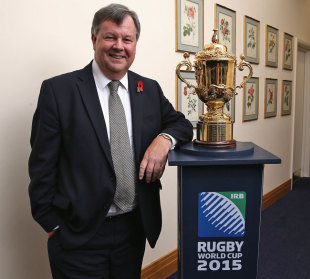|
England
All Blacks 'acid test' of England's progress
ESPN Staff
April 25, 2014

Ian Ritchie: 'We go with a confidence that we're capable of winning'
© Getty Images
Enlarge
Ian Ritchie, the chief executive of the RFU, has said that the summer series against New Zealand is "the acid test" of England's progress and that the future is promising thanks to a sound financial base. In an interview with the Daily Telegraph , Ritchie said that England were aiming to beat the best "so it's a perfect time to be going to New Zealand … we go with a confidence that we're capable of winning. It was a very close game against them here, and the acid test is going there". He said that the model adopted by New Zealand was one that could be learnt from. "It's going back to the general theme of sustainability. If anyone has achieved that, it's New Zealand. I believe we have the resource, the capability, of being better. If you look back over 30, 40, 50 years, we should have done better. "We're fortunate in that economically we're reasonably well set up to invest. And in rugby terms we ought to be able to. We're in a fortunate position of being generally well resourced. I think you'll see that opportunity for raising the bar all over the place." He also spoke for the first time about the settlement reached on the future of European rugby, one in which he played a vital role. For a time it seemed that European club rugby could be split in two, with England facing a real risk of being isolated after an about-turn by France who had initially backed English proposals for a new competition. Ritchie is widely credited for working tirelessly behind the scenes to broker a solution. "You've got to be terribly patient, try to persevere, and to say: what's the objective?" he told the Daily Telegraph. "Throughout the toing and froing of the European thing it seemed pretty clear to me everybody thought the best objective was a six-nation, nine-organisation competition. "Then I said, 'Are we really not going to do this for what are the impediments? Are we not going to have this competition, which is hugely important, because we're having a disagreement about how we govern it?' "Hell's bells. It's only 20 years since rugby went professional. What we have to recognise is that balance between club and country. This is a club competition. We had to find the right balance between the clubs and the countries. We can't stick our heads in the sand and say, 'We don't want the clubs to be successful', because of course we do." © ESPN Sports Media Ltd
|
Live Sports
Communication error please reload the page.
-
Football
-
Cricket
-
Rugby
-
- Days
- Hrs
- Mins
- Secs
F1 - Abu Dhabi GP
Abu Dhabi Grand Prix December 11-131. Max Verstappen ()
2. Valtteri Bottas (Mercedes)
3. Lewis Hamilton (Mercedes)
4. Alexander Albon ()
5. Lando Norris ()
6. Carlos Sainz Jr ()
-
ESPNOtherLive >>
Golf - Houston Open
Snooker - China Open
Tennis - Miami Open

